Photographs: Gus Ruelas/Reuters Rajiv Rao in New Delhi
A few years ago, electric cars were the dogs of the automotive business, money-losing propositions that were either toys for the rich or economic sinkholes disguised as eco-warriors of the future. In three months, all that has changed.
The first bit of news that has electrified the car world is that Tesla - the poster car of the industry and long derided for losing money - turned profitable, not just in its May quarter ($11.2 million) but for the one that ended in June as well ($26 million).
...
Driving into the future with an electric car
Image: Tesla car in New York.Photographs: Shannon Stapleton/Reuters
Then, it upped itself by paying off the $440 million government loan five years early - the only US-based auto company availing of the government’s post-2008 slowdown recovery funds to do so. The underpinning reality driving all of Tesla’s success is simply that its Model S cars are flying out of its showrooms.
According to reports, in the first quarter of 2013, the approximately $80,000 Tesla (fully loaded) put more of its cars in customers’ hands (4,750 units) than other electric stalwarts - the $40,000 Chevy Volt (4,421 units), and the $30,000 Nissan Leaf (3,695 units). It also apparently outstripped the sales of every other $100,000 sedan in the US market with the Mercedes S Class coming a distant second (3,077 units).
...
Driving into the future with an electric car
Image: BMW i3 electric car with Tower Bridge behind it in London.Photographs: Andrew Winning/Reuters
In sales estimates, Elon Musk - founder Tesla and online payment company Paypal - thinks he can sell 21,000 of his cars this calendar year, a staggering eightfold increase over 2012. Following on Tesla’s heels, a somewhat more mainstream - but iconic - car manufacturer has further propelled the possibilities of an electric auto world.
BMW’s i3 is not cheap - around $43,000 in the US for a car - and doesn’t have the sex appeal or the power of the Tesla but it has dazzled people with the sheer structural ingenuity of its product.
Of course, some people might think its leather seats tanned with oil-leaf extract or its wood-panelled dashboard made up of “responsibly farmed” eucalyptus wood and compressed dry grass is just canny marketing gimmickry, but the real engineering wizardry is in its guts.
...
Driving into the future with an electric car
Image: BMW i3 in New York.Photographs: Mike Segar/Reuters
For instance, the i3’s skeleton is made from carbon-fibre-reinforced polymer, a substance that is 30 per cent stronger than steel but half of its weight. The production process involves the carbon fibres being shaped into mats and then glued together using a high-injection process.
The impact-strength is so much greater than other cars that BMW has been able to remove the B-pillar brace that typically partitions the car into the front section and the rear, making the inside huge and seamless. Carbon fibre is far from an eco-friendly product to produce, consuming large amounts of electricity - but BMW churns it out in the state of Washington in the US at a plant that’s powered entirely by hydroelectricity before it’s shipped off to its main factory in Leipzig, Germany, which in turn runs entirely on wind energy.
...
Driving into the future with an electric car
Image: A man drives Reva Electric Car in Santiago, Chile.Photographs: Ivan Alvarado/Reuters
Tesla’s contribution to design innovation is a one-of-a-kind lithium-ion battery assembly resembling a large granite slab that makes up the entire floor of the car and is part of its frame. What lessons do 362 bhp Tesla and the 170 bhp i3 possibly have for India’s own vanguard of the electric revolution, the 25 bhp Reva, recently acquired by Mahindra? Tesla’s cars are unapologetically electric.
They look sleeker than most on the road, can reportedly out-sprint a 1,200 bhp Bugatti Veyron, thanks to the phenomenal, flat torque curve at zero rpm that an electric motor can produce and is a focus of conversation and envy every time it flashes by its slower gasoline-powered in what seems like warp drive.
...
Driving into the future with an electric car
Image: Mahindra's e2o.Photographs: Source: mahindrae2o.com
Could Reva - having sold a little over 4,000 cars in its entire history (about what Tesla does in a month) benefit from upscaling itself? After all, wouldn’t a sexier model driven by Shah Rukh Khan or a Sachin Tendulkar do wonders for the brand?
“From a brand perspective, it’s easier to go from the top to the bottom, but from a cost perspective easier to go bottom to top,” says Chetan Maini, founder and chief technology office of Mahindra Reva, which has just introduced a newer model, the e2o, to the Indian market in April this year.
...
Driving into the future with an electric car
Image: Mahindra's e2o.Photographs: Source: mahindrae2o.com
While it is a quantum leap above its predecessor and is a comfortable 4-seater with a rugged exterior and sleek interior that matches any petrol hatchback in the market - it is not exactly a premium product.
That’s because, in a country that has just started its love affair with SUVs, the e2o caters to a distinctly different set, an urban, increasingly eco-conscious commuter who doesn’t mind paying Rs 6.8 lakh (on road, Delhi) for a second, affordable family car that can only go 100km. That said, Maini says his company is looking to introduce a sportier model that can touch 130km per hour (versus the e2o’s 82kmph) much like the NSX, the company’s earlier sports coupe.
...
Driving into the future with an electric car
Image: Nissan Leaf at the Washington Auto show.Photographs: Gary Cameron/Reuters
The Reva’s 100-km range is one of its biggest shortcomings. Paradoxically, an urban commuter drives far less than that and this shouldn’t be a limiting factor, but ‘range-anxiety’ is a serious psychological factor that stymies potential cross-overs to the electric world.
The Tesla has an unrivalled 426km range and its charging infrastructure in the US is ramping up rapidly, with supercharging stations that can charge 80 per cent of a Model S’s batteries in less than 20 minutes. The BMW i3 by comparison is a laggard, with a 160km range that just about edges out the Nissan Leaf at a reported 75 miles.
...
Driving into the future with an electric car
Image: BMW i3 electric car is unveiled at a ceremony in London.Photographs: Andrew Winning/Reuters
However, the i3 is equipped with an optional range-extending 650cc two-cylinder gasoline engine derived from a BMW scooter that can charge the battery, which can effectively double the range of the car, according to the German auto maker.
That doesn’t mean the Reva is necessarily a perennial poorer cousin. Its telematics - smartphone connectivity that allows you to, say, switch on the AC in your car from your office cubicle to pre-cool it using an app on your phone - was designed ahead of those in its global fancier peers.
...
Driving into the future with an electric car
Image: BMW i3 in Beijing.Photographs: Kim Kyung-Hoon/Reuters
Its panels may not be carbon-fibre cool but are made of high resistance plastic and are dent-proof. Moreover, the panels come ‘colour-impregnated’, obviating the need for environmentally-destructive paints. Adding eco-oomph to the whole value proposition is its Bangalore factory, 35 per cent of which is powered by solar energy.
Sceptics used to deride electric cars for being just as carbon-intensive to produce as gasoline ones. Today, however, factories for electrics have none of the heavy machinery such as conveyer belts and robots used to put together fossil-fuelled vehicles, since much of the pieces for electrics are glued instead of welded.
...
Driving into the future with an electric car
Image: View of the interior of Tesla Model X in Detroit, Michigan.Photographs: James Fassinger/Reuters
An article in MIT’s technology review says “even when you factor in the carbon emissions and pollution from the power plants that produce the electricity to power the cars, and from manufacturing and disposal, electric cars produce about 40 per cent less carbon dioxide and ozone than conventional cars.”
While the world hasn’t yet fully embraced electric cars that might change soon when Tesla introduces two other potentially game-changers: Model X, an SUV-minivan combo that will seat seven adults and sell for around $40,000 range. A sedan priced at about $35,000. Musk has also promised a newer version of the ‘S’ class with a 500-mile range.
...
Driving into the future with an electric car
Image: View of the interior of Tesla Model S in Detroit, Michigan.Photographs: James Fassinger/Reuters
But if you’re worried about affordability, other serious options continue to pop up with regularity. Apparently, while the Chevy Spark isn’t quite as sleek as the i3, it does 95 per cent of what its German compatriot does, and for half the price to boot.
Electric cars still have issues with range and battery technology. In India, the infrastructure is woefully insufficient. But with technology changing at a rapid pace and design innovation pushing the feasibility envelope, electric cars could soon move from being looked at as indulgences to cost-effective necessities.

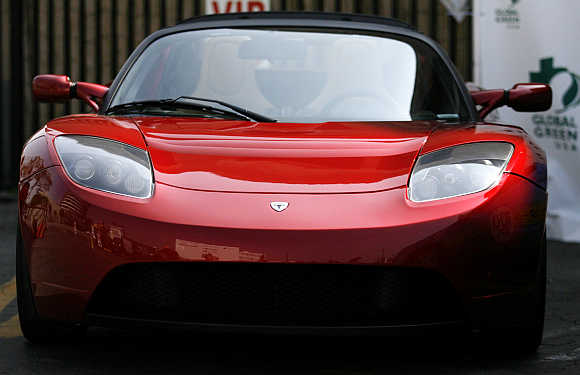
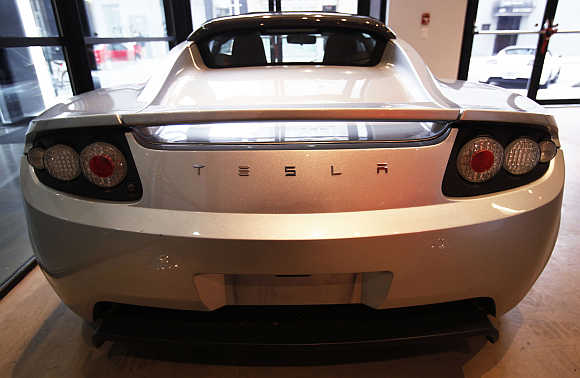
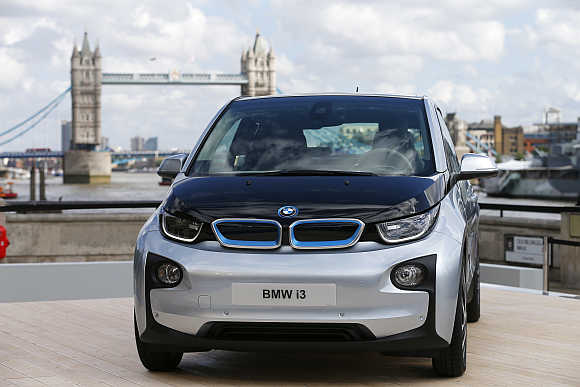
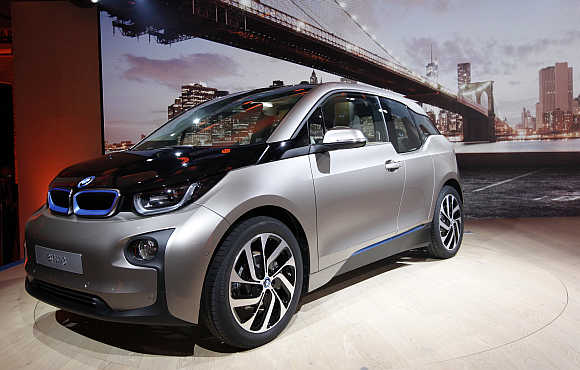

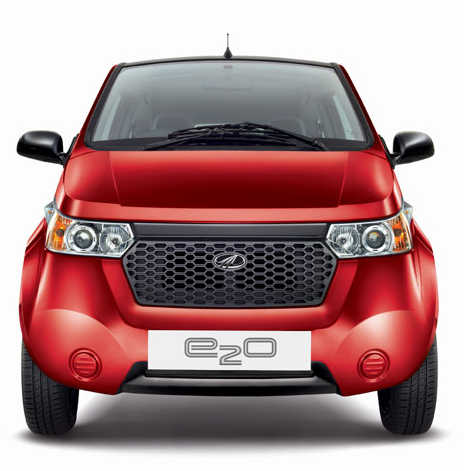
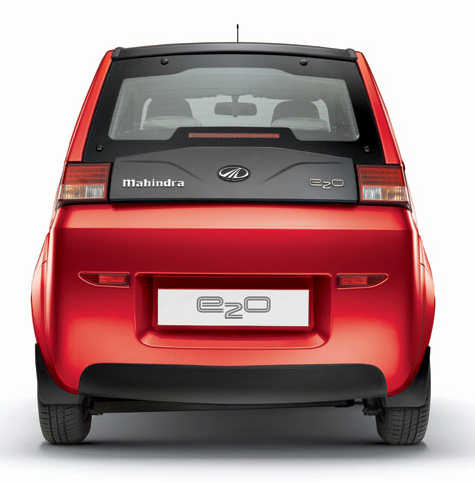


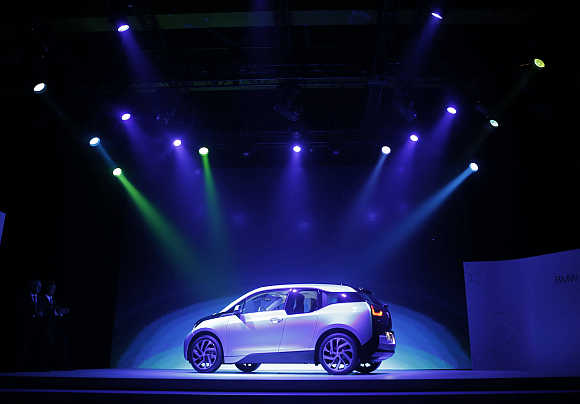
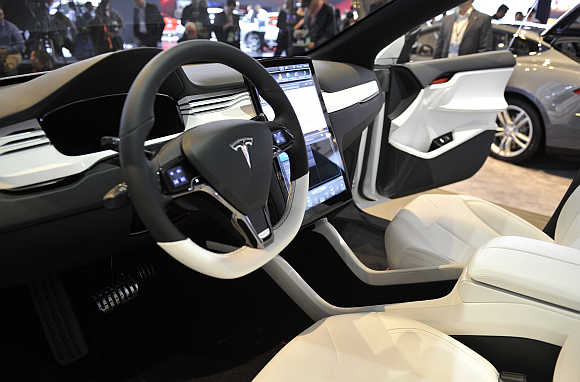
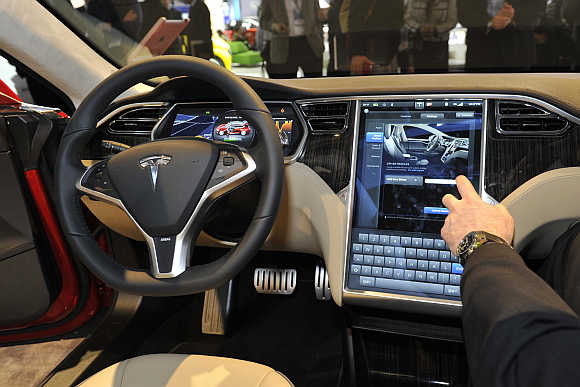

article